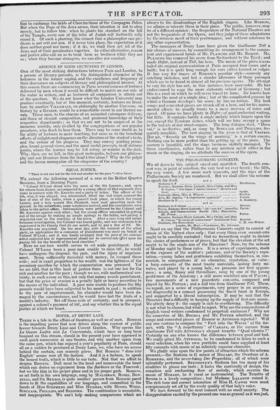EQUAL JUSTICE.
"There is not one law for the rich and another for the poor."—OLD SONG.
WE extract the following account of a case at the Belfast Quarter Sessions, from a Morning Paper. "Colonel 1■11-eod dined with the mess of the 9th Lancers; and, upon his return from dinner, accompanied by a young officer of that regiment, they Came in contact with Mr. Knowles and a party of ladies. The officer of the 9th, who, it was alleged, was intoxicated, lifted the veil which covered the face of one of the ladies, when a quarrel took place, in which the young Lancer; and a lady named Mrs. Plunkett, were sent sprawling upon the ground. In the nidanttnie,.some watchmen arrived; and the combatants were., taken to the polic&office.:- Informations were pieferred by the Colonel and.", Mr. Knowles against each other ; but the young officer succeeded in getting out of the serape by making an ample apology to the ladies, and Paying a stipulated sum to the charities of the town. After a very long and rather tiresome investigation, the Colonel was found guilty, and was sentenced to be imprisoned in the County Gaol for one month, and to pay a fine of 20/. Mr. Knowles was acquitted. On the next day, with the consent of the other party, an application for a-remission of punishment was made on behalf of Colonel M`Leod ; and it was finally arranged that the part of the sentence which subjected him to imprisonment should not be carried into effect upon his paying 50/. for the benefit of' the local charities." Here we see how Wealth serves to set aside punishment: Had Colonel. M`LEon been a poor man unable to raise 501., he would have undergone the disgrace, the pain, and the injury of imprison- ment. Being sufficiently furnished with money, he escaped these evils ; and in exact proportion to his wealth was the lightness of the pecuniary sacrifice by which the commutation was procured. Yet we are told, that in this land of justice there is not one law for the rich and another for the poor ; though we see, with mathematical cer- tainty, in such a case as this, not only that money avoids punishment, but that the price of evasion is a penalty light or heavy according to the means of the individual. A poor man unable to produce the fifty pounds would have been subjected to his month in gaol ; in addition to the pain of imprisonment, his character would have been da- maged by the circumstance, and he would have lost the fruits of a month's industry. Set off these evils of certainty, and in prospect, against a colonel's payment of 501., and say whether this is the equal justice of which we boast.


















 Previous page
Previous page